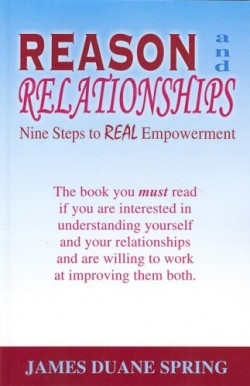
Reason and Relationships
Nine Steps to Real Empowerment
“We are all pretty much the same under the skin whether we like to think so or not” James Duane Spring writes. Applying the truth of this statement to the attempt to understand why human beings have such a difficult time relating to each other is a major life task for all who seek to create healthy professional and personal relationships. Spring brings his own life experience and time spent at colleges and universities to bear in his analysis of human passions and how they must be guided by reason if positive interactions between individuals are to occur.
Spring’s work is based on the premise that relationships are the most important thing in life. Without the meaningful give-and take of relationships there is no way to learn and test one’s skills and knowledge grow in compassion and love and learn to compete and to share. Relationships provide the response of the world and form the web upon which individual life is built and contributions to the greater whole are made. Since the primary relationship one has is with oneself and since genetics and early life experience play important roles in human development self-knowledge and the use of reason are crucial in enabling one to build the self one hopes to be upon the structure of what one has been given.
Real empowerment of the type that can carry one through serious loss and misfortune is not based upon wealth fame material goods or the amount of authority one has over others but rather it lies in one’s attainment of self-understanding and self-control. Spring calls those who have attained these virtues “reasonable” people and attributes to them characteristics including respect and understanding patience the possession of a “normal” need and desire for social interaction an appreciation of the differences between people and the recognition that life is change.
The author sees the mad rush to acquire material “things” as a major hindrance to the development of quality relationships. Excessive desire for material possessions and being overly attached to them diminishes one’s personal power and increases the stress in one’s life. Beyond personal happiness one’s ultimate goal should be to live the universal “golden rule” and thus create a world in which all can live in peace. Spring provides exercises to bring readers closer to this goal and although collaboration with an editor who could give his work better flow and clarity would enhance readers’ pleasure in acquiring this information the author has made a thoughtful and insightful contribution to the literature on relationships.
Disclosure: This article is not an endorsement, but a review. The publisher of this book provided free copies of the book and paid a small fee to have their book reviewed by a professional reviewer. Foreword Reviews and Clarion Reviews make no guarantee that the publisher will receive a positive review. Foreword Magazine, Inc. is disclosing this in accordance with the Federal Trade Commission’s 16 CFR, Part 255.
